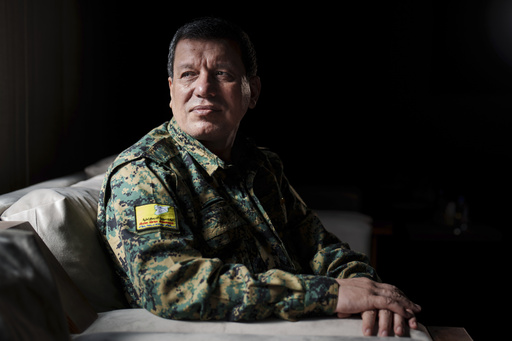
HASSAKEH, Syria — In a significant development, the leader of the primary US-backed force in Syria has expressed that the recent ousting of the Assad family should pave the way for establishing a secular, civil, and decentralized state that guarantees equal treatment for all citizens irrespective of their religious or ethnic backgrounds.
In an interview, Mazloum Abdi, the commander of the Kurdish-led Syrian Democratic Forces (SDF), shared insights about his recent discussions with the newly appointed interim President Ahmad al-Sharaa in Damascus. He stated that both parties are engaged in negotiations with mediators to work towards compromises regarding the future governance of Syria, particularly concerning the rights and status of the Kurdish population.
Abdi emphasized the necessity of maintaining American troops in Syria, arguing that their withdrawal could open the door for the resurgence of the Islamic State group, jeopardizing regional security.
The regime of the Assad family, which ruled Syria for 54 years, came to an abrupt halt in early December after Damascus was seized by insurgents from the Islamist group Hayat Tahrir al-Sham (HTS). The downfall of Bashar Assad on December 8 occurred in the aftermath of nearly 14 years of conflict, resulting in the deaths of half a million individuals and displacing millions more.
Following the overthrow of the Assad regime, various Syrian factions convened in Damascus last week, where they appointed HTS leader al-Sharaa as the interim president. As part of this transition, the factions annulled the 2012 constitution adopted during Assad’s rule and disbanded the national army along with Syria’s notorious security agencies.
Abdi remarked that the fall of the Assad regime marked a pivotal moment in Syria’s history, advocating for the establishment of a new Syria devoid of the Baath Party and its ideologies. “We aspire to progress together for Syria’s future,” he stated.
When questioned about the recent appointment of al-Sharaa as interim president in the absence of the SDF’s presence during the meeting, Abdi mentioned, “We were not involved in those discussions and will refrain from commenting.” He noted that many negotiations are ongoing between al-Sharaa and the SDF, and future SDF decisions will depend on the outcomes of these discussions.
Continuing efforts to foster dialogue, Abdi revealed that visits by SDF officials to Damascus will persist as they seek cooperation with the new regime. He affirmed, “We aim to collaboratively envision what the future of Syria will be like.”
Additionally, Abdi disclosed that members from the US-led coalition tasked with combating the Islamic State are facilitating these discussions between the SDF and the Syrian authorities, although he didn’t elaborate on specifics. He reiterated that the SDF desires a unified Syria with a central government situated in Damascus.
“Our interpretation of Syria is a democratic, decentralized, and civil nation that honors the rights of all its diverse components,” Abdi explained, referencing the various religious and ethnic groups in the country, which include Sunni Muslims, Christians, Alawites, Druze, Yazidis, Arabs, Kurds, Turkmen, and Armenians. He emphasized that Syria’s populace is heterogeneous and not solely composed of Sunni Muslims, who represent the majority.
Concerns loom regarding HTS’s operations, particularly its potential efforts to establish an Islamic state. However, al-Sharaa has seemed to shift towards promoting religious coexistence in recent years.
Despite aspirations for a decentralized state, Abdi clarified that the Kurdish people do not seek to sever ties with Syria or establish an autonomous governance system akin to what is seen in northern Iraq. He articulated a desire to manage local affairs within a decentralized framework within Syria’s borders. “Syria is distinct from Iraq, and northeast Syria is not akin to Iraq’s Kurdistan,” he asserted.
While many former insurgent factions have signaled their intention to dissolve and integrate into the new military and security structures, the future role of the SDF remains uncertain. When asked if he is ready to dissolve the SDF, Abdi communicated that, in principle, they are open to becoming part of the defense ministry and contributing to the national defense strategy, yet further discussions are required. He mentioned that a proposal regarding this matter has already been forwarded to Damascus, and they are awaiting feedback.
Abdi underscored the longstanding efforts of SDF fighters in battling IS and insisted that the rights of his personnel must be protected.
Concerning the status of IS, Abdi noted that the group exploited the chaos following Assad’s fall, seizing considerable weaponry from abandoned military posts. He reiterated the importance of keeping US troops in Syria to bolster the fight against IS, stating that the rationale for their presence remains valid as the group continues to pose a threat.
While recalling 2019, when a partial US troop withdrawal was initiated by former President Trump but ultimately halted, Abdi voiced hope that the coalition would not withdraw completely. “We are unaware of any impending US plans to exit Syria and earnestly request them to remain,” he concluded.

